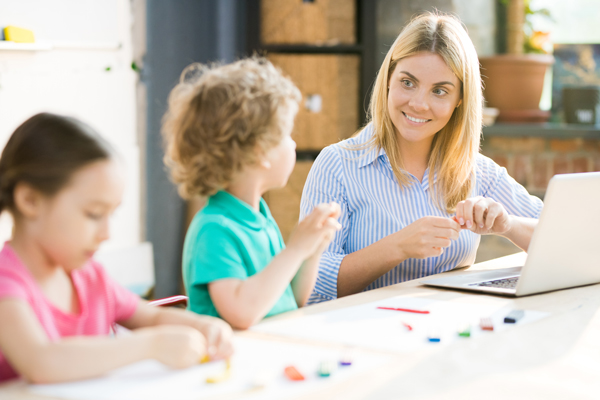Almost everyone has a teacher from their childhood they still remember fondly as an adult—one who made a lasting impact or influenced how they see the world beyond the walls of the classroom. No matter which grade you teach, positive relationships between you and your students can factor into student outcomes. This post will explore why building relationships with students is important and give some easy, everyday ideas on how to build positive teacher-student relationships in your classroom.

Why Building Positive Teacher-Student Relationships Is Important
Positive relationships support learning and academic success. American Psychological Association experts assert that improving relationships with teachers has important, positive, and long-lasting implications for students’ academic development. Many studies have shown positive teacher-student relationships promote academic performance. In one study, New York University researchers linked teacher-student closeness to gains in elementary students’ reading achievement.
From preschool through high school, strong relationships between students and their teachers can substantially impact their academic success. A review of dozens of studies showed better quality teacher-student relationships were associated with enhanced student engagement, leading to improved academic grades.
An analysis in the Review of Educational Research concludes warm and empathic relationships that encourage thinking and learning correlate with increased student participation, critical thinking, satisfaction, and both perceived and actual achievement.
Building a relationship gives students extra motivation. Educational philosopher Nel Noddings summarizes that “it is obvious that children will work harder and do things—even odd things like adding fractions—for people they love and trust.”
In many studies, including one published by the Journal of School Health, teachers who experience close relationships with students have reported students are less likely to avoid school and tend to be more motivated learners. Positive teacher-student relationships help draw students further into their studies, promoting their desire to learn from an adult they view as invested in their success and someone they want to impress with their schoolwork.
A positive relationship improves mental health—for both students and teachers. Especially in students deemed “at-risk” or experiencing learning difficulties, a healthy and encouraging relationship with a teacher can help cultivate and develop a sense of self-worth, confidence, and overall improved mental health.
However, students aren’t the only ones who benefit. Good relationships with students are important for teachers, too. One study found student-teacher relationships were a strong predictor for a teacher’s increased levels of joy and lower feelings of anxiety.
Healthy relationships encourage good student behavior. In addition to providing a motivational trigger for engagement with learning, studies suggest having a caring teacher encourages prosocial behaviors in their students.
A University of Cambridge study found positive teacher-student relationships can be as effective as anti-bullying programs and similar interventions. At the ages between 10 and 11 specifically, a good relationship with a teacher markedly increased the development of prosocial behaviors, including cooperation and altruism.
Researchers found students with a more positive relationship with their teacher displayed 18 percent more prosocial behavior toward peers. They also displayed up to 38 percent less aggressive behavior toward peers.
How to Build Relationships with Students
Every student is different, meaning there will be a host of unique and potentially nuanced factors influencing teacher-student relationships. Here are some steps you can take to build better relationships with your students.
- Make genuine attempts to get to know them. There are many simple yet effective solutions for building relationships and getting to know your students. For some, simply remembering their name’s correct pronunciation is a good start. Spend some time on Friday afternoons asking about any upcoming plans. Catch up and share any fun or exciting stories from the weekend on Monday morning. Encourage students to open up and recall small details to help students feel heard. Soon, you will be someone they can open up to—not just an authority figure who doles out homework assignments.
- Make lessons engaging to your classroom’s interests. If your students frequently discuss the latest popular entertainment, games, or trends, try tweaking a story or example in a lesson to include relevant characters’ names or other details from their outside interests.
- Try a few icebreakers. Fitting short, fun social games into class time can help students relax and calm their nerves. Students make connections and discover similar interests among peers, and you learn more about your students.
- Keep an open dialogue with students. It’s important to remember that students, at any age, are developing and complex people. Relationship and behavioral issues may arise simply due to human nature or influences outside the classroom and out of a teacher’s control. Being an attentive, receptive listener will encourage students to speak up and build trust.
To pursue more methods of engaging and fostering bonds with your students, subscribe to Avanti. With a sole focus on professional learning resources for teachers, our convenient on-demand videos and materials developed by practicing teachers provide insight and strategies for building positive relationships, student engagement, instruction, and more for better student outcomes. Register for a free one-week trial today.
